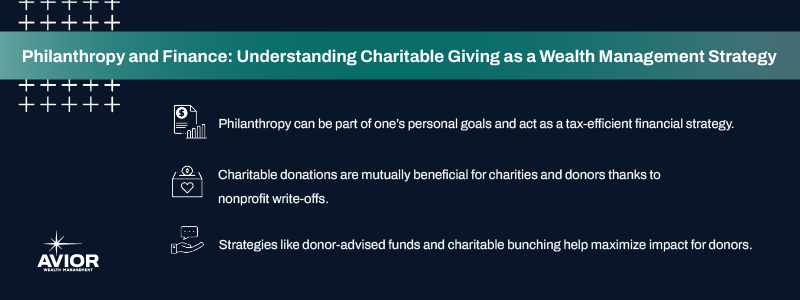Philanthropy and Finance: Understanding Charitable Giving as a Wealth Management Strategy
Charitable giving is a topic that’s commonly covered in financial planning. Find out how to understand it as both a fulfilling, generous action and a tax-efficient wealth management strategy.

Charitable giving is a key component of wealth management for lots of people. Beyond its role in securing tax benefits, philanthropy is a long-term commitment that can align with personal values – individually or as a family, sometimes for multiple generations.
In this guide, I’ll walk through what philanthropy looks like within financial planning, charitable giving tax planning strategies, and how personal values and wishes must be aligned for an effective philanthropic approach.
The dynamics of charitable giving
People pursue charitable giving for many reasons. They want to feel connected to the bigger world and society and support their communities. They may have causes that are close to their hearts for unique reasons, such as an illness in the family, religion, the need to find a community of like-minded individuals, and other reasons.
Indeed, many individuals/families also pursue philanthropy as part of their wealth management strategy. There are tax benefits to consider with charitable giving, as it’s a common way to avoid hefty estate, capital gains, and other taxes. Charitable giving can also help you preserve wealth and secure multigenerational capacity for that wealth with donor-advised funds or charitable groups. Philanthropy is often a key part of legacy planning.
For example, if someone starts their own foundation, their children and grandchildren can manage it for years to come. It becomes a multigenerational initiative.
Though philanthropy has tax advantages, giving should come from the heart to be sustainable. Philanthropy needs to come from the heart first, then the mind. You can then make intellectual sense of philanthropy from a tax and numbers perspective. This will lead to a fuller life from helping your community on top of meeting your family’s goals.
Next, let’s learn more about the tax side of things.
The tax advantages of charitable giving
Regarding charitable donations and nonprofit write-offs, you can donate property and pretty much anything else through a charitable organization. You can also create your own organization or donate directly to a charity. Giving has to be measured at current market value, and then you receive that amount as a deduction on your tax return.
Philanthropy-related tax credits are available in some states but not all. These credits may apply when you pay toward a qualified charitable organization – like schools or foster care, for example – and there’s a limit based on your filing status. It goes directly against your state tax liability, dollar for dollar, so you’re essentially writing a check to the philanthropies you want to support instead of the government.
What you gave in cash and non-cash gifts throughout the year, you will report on Schedule A of your tax return. It’s an itemized deduction, and it reduces income and personal tax liability.
More importantly, by giving these gifts, you’re furthering the charitable intent of the organizations you support. If you have a specific agenda around a condition like arthritis, for example, you can make a cash gift. Or, you can donate clothing to Goodwill. Whatever your goals are, charities cannot support those in need without these gifts and donations. So, giving becomes mutually beneficial.
So, what charitable giving strategies should you consider?
How to maximize philanthropic impact
Certain types of donations yield substantial tax savings and have big impacts on financial planning. It’s important to understand the different donation types when considering wealth management. Two of note are giving through an IRA and appreciated assets.
When someone is subject to a required minimum distribution (RMD) from their IRA account, they can gift up to $100,000 to a qualified charitable organization, and they are effectively giving pre-tax money by giving directly to that organization. They’re not being taxed on that gift.
Also, consider appreciated assets if you’re trying to gift something like stock or land. For example, say you bought Apple stock very early on and held on to it. Say it cost you a dollar then, and now it’s worth $100. You can give that away and get full credit for that deduction at $100, but you don’t have to pay any capital gains tax and the charity gets the full benefit. When they sell it, they don’t pay any tax on it, either.
Additionally, donor-advised funds (DAFs) allow people to donate appreciated property or cash into a fund where they’re the donors. They can donate an unlimited amount and take the deduction for that amount. You have the option of investing the funds and allocating how much you want to give each year and you can make it generational as well. If you don’t want to create your own foundation, this is a great substitute for a foundational-like platform.
Another strategy is called charitable bunching. Many people tithe annually – say they give 10% of their annual income to a religious organization. It is a great way to honor their charitable goals, and charitable bunching can be a wise way to do it. Charitable bunching essentially allows you to consolidate your donations for two years into one year to maximize your itemized deduction for the year you make the donation. You’ll get all the tax benefits and meet your tithing goals.
With charitable bunching, you’re not reducing the amount you would be gifting because you can allocate that second years’ worth of tithes the following year when you’re taking the standard deduction.
Next, let’s dig deeper into why it’s important to align your values with philanthropy planning.
Aligning values and philanthropy in wealth management
Philanthropy has to be part of your value system for it to stick. It is a big investment, both emotionally and financially. Avior advisors will ensure clients recognize the benefits, and that incremental gifting strategies won’t cost them their child’s college education. By being strategic, it ends up being extremely beneficial.
Giving can look many different ways. It could be volunteering. It could be giving funds throughout your entire life. It’s important to plan how it will work in the bigger wealth management picture. Like a pie chart, plan out how you’re allocating your resources so you can identify priorities. If philanthropy isn’t aligned with your personal goals, it won’t last for the long term. It will be the first thing dropped if it doesn’t align with what you care about most.
The biggest psychological benefit of charitable giving is the association you have with contributing to society. This is a deep, fundamental need of humans. Without giving and connecting, we may feel isolated. It’s vital to feel like an engaged part of society as it provides connection and perspective.
Pursue your philanthropy goals with Avior
There are many tax benefits to charitable giving. However, the primary driver behind philanthropy should come from the heart and personal values and goals. Strategies like donor-advised funds and charitable bunching will ensure you’re maximizing your impact and considering tax implications.
With a holistic wealth management strategy, you and your family can meet your giving goals and continue to secure your wealth in the long term. The advisors at Avior are here to guide you along the way. Contact our team to talk with us about your financial planning goals.
Byline: Sharlee is the president of SC Financial Services, a DBA of Avior Wealth Management LLC. Having worked in the financial services industry for over 30 years, she currently specializes in assisting individuals and their families with the complexities of planning for and creating multi-generational wealth. Seeing the burden of parents who want to provide for their children yet not inhibit their personal growth, she builds financial plans around these intentions so that the entire family can contribute to their communities. Sharlee sees education and communication as the best ways to assist these families as they navigate transitions to the next generation.
Disclaimer: Nothing contained herein should be construed as legal or tax advice. Avior and our Advisors will work with your attorney and/or tax professional to assist with your legal and tax strategies. Please consult your attorney or tax professional with specific legal and/or tax questions. Investment Management and Financial Planner are offered through Avior Wealth Management, LLC, an SEC-registered investment advisor. Past performance is not a guarantee of future results. Investments are subject to loss, including the loss of principal.
No Comments
Sorry, the comment form is closed at this time.




